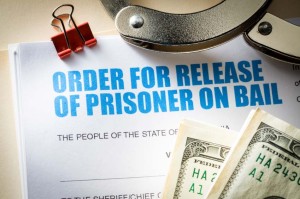Jail, Bail & Bond
During sentencing, or as a result of arrest, you may be sent to jail.
If you are arrested, under certain circumstances you can be released (bailed) from jail after posting a bond which promises that you will return for any required court appearances. The court may impose additional conditions for your release such as sobriety, random drug and alcohol testing, or 12-step self help meetings, or a no contact order.
 After the bail amount is set, you must pay that amount, or sit in jail to await an appearance before the judge. If you have the money to pay the bail, you simply pay and be released subject to any court conditions.
After the bail amount is set, you must pay that amount, or sit in jail to await an appearance before the judge. If you have the money to pay the bail, you simply pay and be released subject to any court conditions.
But, sometimes you cannot afford the bail amount, so, you may engage the services of a bond agent. A bail bond agent is the generic term for an organization that will put up the security needed for your pre-trial release in exchange for a fee. The fee is 15% of the total bail. So, if bail is set at $3,000, you will have to pay the bail agent $450 plus a $50 a court fee. If you do so, you can leave jail because the bond agent will guarantee the rest of the money to the court in the event that you flee, or fail to appear in court. The bond agent may need collateral against the security, and so you might offer a mortgage on a house, title to a car, or some other valuable item such as jewelry.
After your trial, regardless of your guilt or innocence, the bond agent keeps the $450 as payment for agreeing to be liable for the total amount of your bond to the court.
However, if you have posted cash bail with the court, or a friend or family member has posted cash bail with the court, if the case has been dismissed or you have been found innocent, the money is returned to the person who posted it on your behalf.
Of course, if you are convicted, the bail money may be used by the court to help satisfy fines, fees and/or restitution.
